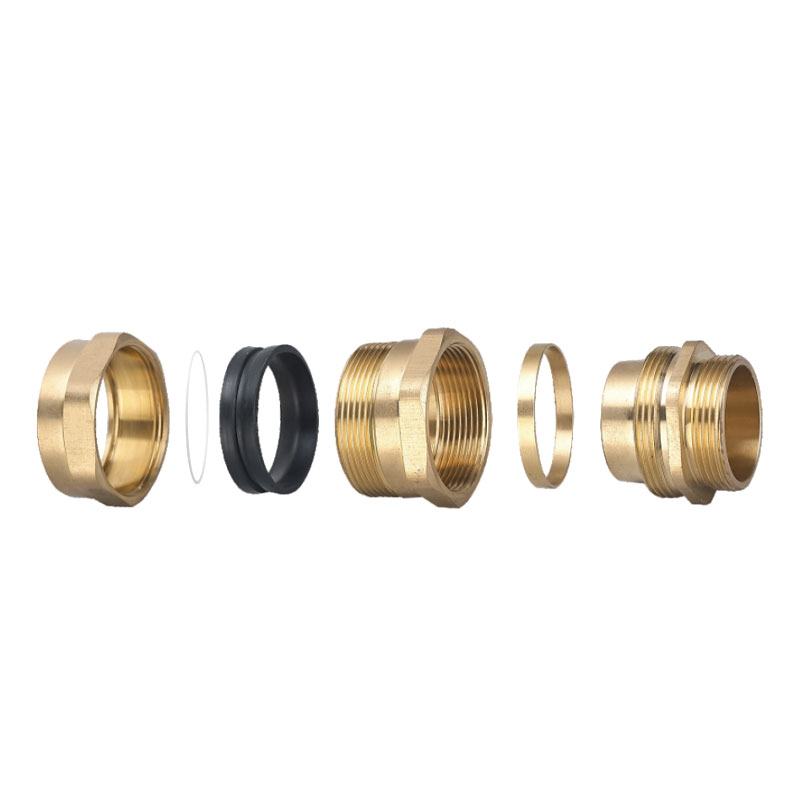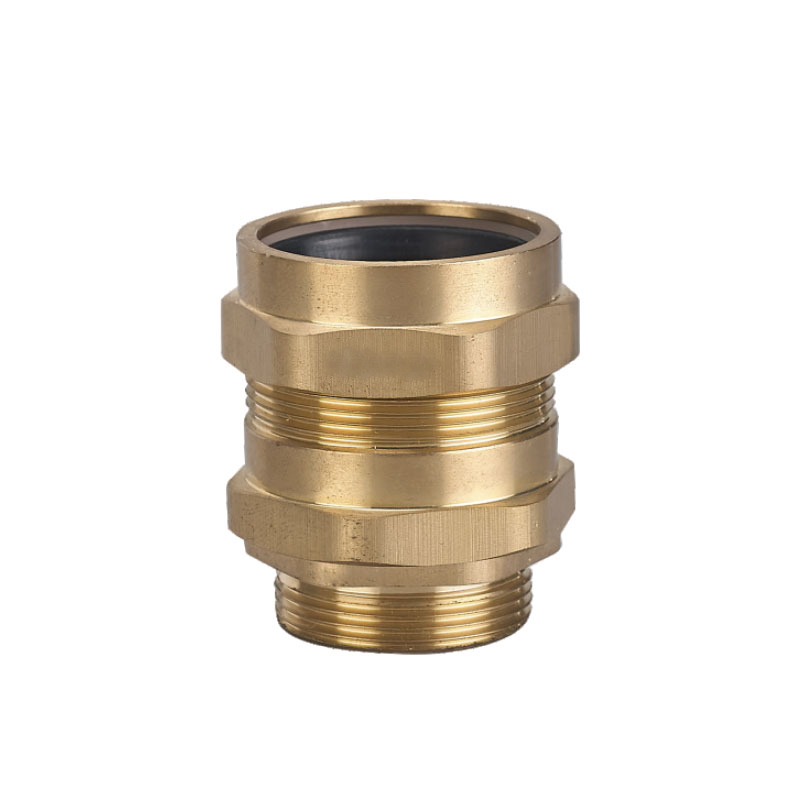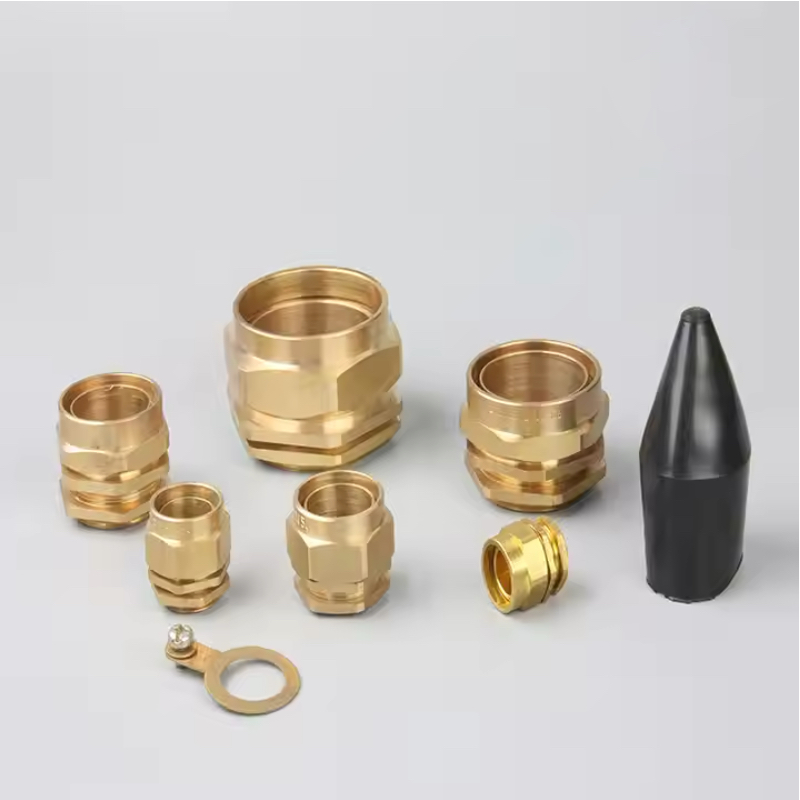Understanding the intricate construction of A2 type brass cable glands is crucial for engineers and procurement managers who need reliable cable termination solutions. Many professionals struggle with selecting the right cable gland specifications without fully understanding the internal construction and how each component contributes to overall performance.
Οι ορειχάλκινοι στυπιοθλίπτες καλωδίων τύπου Α2 διαθέτουν στιβαρή κατασκευή πολλαπλών συστατικών που περιλαμβάνει ορειχάλκινο σώμα με μετρικό σπείρωμα, σύστημα στεγανοποίησης συμπίεσης, μηχανισμό ανακούφισης από τάσεις και ενσωματωμένη συνέχεια γείωσης, σχεδιασμένοι ειδικά για τερματισμό θωρακισμένων καλωδίων με περιβαλλοντική προστασία IP68 και μηχανική αντοχή για βιομηχανικές εφαρμογές που απαιτούν μακροχρόνια αξιοπιστία.
Just last month, Robert, a project engineer from a manufacturing facility in Birmingham, UK, contacted me after experiencing seal failures with inferior cable glands. His team needed to understand the precise construction differences between A2 type brass glands and standard versions to prevent costly equipment downtime in their automated production lines 😉
Πίνακας περιεχομένων
- What Makes A2 Type Brass Cable Glands Unique?
- How Are the Key Components Constructed?
- What Materials and Manufacturing Processes Are Used?
- How Does the Sealing System Work?
- What Are the Quality Standards and Testing Requirements?
- FAQs About A2 Type Brass Cable Gland Construction
What Makes A2 Type Brass Cable Glands Unique?
The A2 designation represents a specific construction standard that differentiates these cable glands from other types in terms of design philosophy and application focus.
A2 type brass cable glands are specifically engineered for armored cable termination with enhanced mechanical strength, featuring a specialized construction that includes armor clamping mechanisms, extended thread engagement, reinforced body design, and superior earthing continuity1 compared to standard cable glands, making them ideal for heavy-duty industrial applications.
Design Philosophy and Standards
A2 Construction Standards:
- Enhanced mechanical strength requirements
- Specialized armored cable accommodation
- Extended service life specifications
- Superior environmental protection ratings
- Integrated earthing and bonding capabilities
Key Differentiating Features:
- Reinforced body wall thickness (minimum 2.5mm)
- Διευρυμένο μήκος εμπλοκής σπειρώματος
- Specialized armor clamping system
- Enhanced sealing performance
- Ανώτερη αντοχή στη διάβρωση
Construction Specifications
| Στοιχείο | A2 Type Specification | Τυποποιημένος τύπος |
|---|---|---|
| Body Wall Thickness | 2.5-4.0mm | 1.5-2.5mm |
| Δέσμευση νήματος | 8-12 threads minimum | 5-8 threads |
| Sealing Rings | Dual compression system | Single seal |
| Σφιγκτήρας πανοπλίας | Integrated design | Optional/separate |
| Βαθμός υλικού | CW617N/CW614N2 | CW617N standard |
| Βαθμολογία IP | IP68 guaranteed | IP65-IP67 typical |
Application-Specific Design Elements
Armored Cable Optimization:
- Specialized armor wire accommodation
- Integrated armor clamping mechanism
- Enhanced strain relief design
- Superior earthing continuity
- Mechanical protection features
Industrial Environment Adaptation:
- Vibration resistance construction
- Temperature cycling durability
- Ιδιότητες χημικής αντοχής
- UV stability for outdoor use
- Αντοχή σε μηχανική κρούση
Πλεονεκτήματα απόδοσης
Enhanced Reliability:
- 25+ year service life expectation
- Superior environmental sealing
- Μειωμένες απαιτήσεις συντήρησης
- Consistent performance under stress
- Προβλέψιμοι τρόποι αστοχίας
Λειτουργικά οφέλη:
- Simplified installation procedures
- Reduced inventory complexity
- Χαμηλότερο συνολικό κόστος ιδιοκτησίας
- Βελτιωμένη αξιοπιστία του συστήματος
- Enhanced safety performance
At Bepto, our A2 type brass cable glands undergo rigorous quality control processes in our CNC machining facilities. We maintain strict dimensional tolerances and material specifications to ensure consistent performance across all production batches.
How Are the Key Components Constructed?
Each component of an A2 type brass cable gland serves a specific function and requires precise manufacturing to achieve optimal performance.
A2 type brass cable glands consist of seven primary components: the main body with metric threads, compression nut, sealing washers, compression cone, armor clamp ring, earthing tag, and strain relief boot, each manufactured to precise tolerances using specialized machining processes and quality-controlled brass alloys for maximum durability and performance.

Main Body Construction
Body Design Features:
- CNC-machined from solid brass bar stock
- Metric thread specification (M12-M75 range)
- Integrated sealing surfaces with precise finish
- Internal cable accommodation chamber
- Armor wire termination area
Διαδικασία κατασκευής:
- Computer-controlled turning operations
- Thread rolling for superior strength
- Surface finishing to Ra 1.6 specification
- Dimensional inspection at multiple stages
- Final assembly preparation
Compression System Components
Compression Nut Design:
- Hexagonal external profile for tool engagement
- Internal compression thread system
- Integrated sealing surface preparation
- Torque specification optimization
- Anti-seizing surface treatment
Sealing Washer Construction:
- EPDM rubber compound selection
- Shore A hardness 70±5 specification
- Temperature range -40°C to +125°C
- Ιδιότητες χημικής αντοχής
- Αντίσταση συμπίεσης
Armor Clamping Mechanism
Armor Clamp Ring Features:
- Serrated internal surface for wire grip
- Tapered design for compression action
- Corrosion-resistant surface treatment
- Precise dimensional control
- Integration with earthing system
Earthing Tag Construction:
- Brass or stainless steel material
- M4 or M5 earthing screw provision
- Low-resistance electrical path
- Corrosion protection coating
- Mechanical strength verification
Strain Relief System
Boot Design Elements:
- Flexible elastomer material selection
- Graduated flexibility zones
- Cable diameter accommodation range
- Environmental protection properties
- Long-term durability characteristics
Προδιαγραφές επιδόσεων:
- Bend radius protection: 6x cable diameter
- Temperature stability: -40°C to +100°C
- UV resistance for outdoor applications
- Oil and chemical resistance
- Fatigue resistance testing
Μέτρα ελέγχου ποιότητας
Επιθεώρηση εξαρτημάτων:
- Dimensional verification using CMM
- Ανάλυση σύνθεσης υλικού
- Μέτρηση επιφανειακού φινιρίσματος
- Thread gauge verification
- Assembly fit testing
Επικύρωση επιδόσεων:
- Torque testing for proper assembly
- Sealing performance verification
- Δοκιμή ηλεκτρικής συνέχειας
- Environmental exposure testing
- Long-term durability assessment
Ahmed, who manages electrical installations for a petrochemical facility in Dubai, UAE, required detailed component specifications for his ATEX Zone 1 applications. Our engineering team provided comprehensive construction drawings and material certificates, enabling his team to achieve full regulatory compliance with superior long-term performance.
What Materials and Manufacturing Processes Are Used?
The selection of materials and manufacturing processes directly impacts the performance, durability, and cost-effectiveness of A2 type brass cable glands.
A2 type brass cable glands utilize CW617N or CW614N brass alloys for the main body, providing excellent corrosion resistance and machinability, with EPDM sealing materials, stainless steel hardware, and specialized surface treatments, manufactured using precision CNC machining, thread rolling3, and automated assembly processes to ensure consistent quality and performance.
Primary Material Selection
Brass Alloy Specifications:
- CW617N (58% copper, 39% zinc, 2% lead)
- CW614N (58% copper, 39% zinc, 3% lead)
- Excellent corrosion resistance properties
- Superior machinability characteristics
- Optimal strength-to-weight ratio
Ιδιότητες υλικού:
- Tensile strength: 380-420 MPa
- Yield strength: 140-180 MPa
- Elongation: 15-25%
- Hardness: 80-120 HB
- Electrical conductivity: 26-28% IACS
Sealing Material Technology
EPDM Rubber Characteristics:
- Ethylene Propylene Diene Monomer base
- Shore A hardness 70±5
- Temperature range: -40°C to +125°C
- Excellent ozone resistance
- Superior weathering properties
Alternative Sealing Materials:
- NBR for oil resistance applications
- Viton for chemical resistance
- Silicone for extreme temperatures
- TPE for food-grade applications
- Custom compounds for specific needs
Manufacturing Process Overview
CNC Machining Operations:
- Computer-controlled turning centers
- Multi-axis machining capabilities
- Automated tool changing systems
- Real-time dimensional monitoring
- Στατιστικός έλεγχος διαδικασίας
Thread Manufacturing:
- Thread rolling for superior strength
- Precise pitch and profile control
- Βελτιστοποίηση του φινιρίσματος της επιφάνειας
- Επαλήθευση της ακρίβειας διαστάσεων
- Thread gauge inspection
Surface Treatment Processes
Προστασία από διάβρωση:
- Nickel plating for enhanced durability
- Chromium plating for wear resistance
- Επεξεργασίες παθητικοποίησης
- Organic coating systems
- Specialized marine coatings
Quality Enhancement:
- Surface roughness control
- Dimensional stability improvement
- Appearance standardization
- Βελτιστοποίηση επιδόσεων
- Μακροπρόθεσμη αντοχή
Quality Assurance Systems
Πιστοποίηση υλικού:
- Mill test certificates for all materials
- Chemical composition verification
- Mechanical property testing
- Τεκμηρίωση ιχνηλασιμότητας
- Προγράμματα πιστοποίησης προμηθευτών
Έλεγχος διεργασιών:
- Statistical process monitoring
- Automated inspection systems
- Προγράμματα συνεχούς βελτίωσης
- Διαδικασίες διορθωτικών ενεργειών
- Ενσωμάτωση ανατροφοδότησης πελατών
At Bepto, we maintain strict material traceability from raw material receipt through final product delivery. Our ISO9001 and IATF16949 certifications ensure consistent quality and continuous improvement in our manufacturing processes.
How Does the Sealing System Work?
The sealing system is the most critical aspect of A2 type brass cable gland construction, determining environmental protection and long-term reliability.
A2 type brass cable glands employ a dual-compression sealing system featuring primary cable sealing through radial compression of EPDM washers against the cable jacket, and secondary environmental sealing via thread-mounted O-rings, creating IP68 protection through controlled compression forces that maintain seal integrity across temperature variations and mechanical stress.
Primary Sealing Mechanism
Cable Jacket Sealing:
- Radial compression against cable outer jacket
- Ομοιόμορφη κατανομή πίεσης στην περιφέρεια
- Accommodation of cable diameter variations
- Compensation for thermal expansion/contraction
- Long-term seal integrity maintenance
Compression Force Control:
- Calculated compression ratios for optimal sealing
- Torque specifications for consistent results
- Over-compression prevention mechanisms
- Under-compression indication systems
- Field verification procedures
Secondary Environmental Sealing
Thread Sealing System:
- O-ring seals in thread engagement area
- Protection against ingress through threads
- Redundant sealing for critical applications
- Maintenance accessibility features
- Μακροπρόθεσμη σταθερότητα επιδόσεων
Sealing Performance Characteristics:
- IP68 rating verification testing
- Pressure resistance up to 10 bar
- Απόδοση κύκλων θερμοκρασίας
- Ιδιότητες χημικής αντοχής
- UV degradation resistance
Sealing Material Performance
EPDM Sealing Properties:
- Εξαιρετική αντοχή σε συμπίεση
- Wide temperature operating range
- Superior ozone and weather resistance
- Chemical compatibility with most cables
- Long-term aging characteristics
Δοκιμές επιδόσεων:
- Accelerated aging tests at elevated temperatures
- Compression set testing per ASTM D395
- Αξιολόγηση χημικής αντοχής
- UV exposure testing
- Thermal cycling verification
Installation Critical Factors
Proper Assembly Techniques:
- Απαιτήσεις προετοιμασίας καλωδίων
- Sealing washer positioning
- Compression nut torque specifications
- Κριτήρια οπτικής επιθεώρησης
- Performance verification methods
Συνήθη σφάλματα εγκατάστασης:
- Insufficient cable preparation
- Incorrect sealing washer orientation
- Over-tightening causing seal damage
- Μόλυνση κατά τη συναρμολόγηση
- Inadequate performance verification
Maintenance and Service Life
Seal Inspection Requirements:
- Visual inspection for damage or degradation
- Torque verification procedures
- Performance testing methods
- Κριτήρια και διαδικασίες αντικατάστασης
- Απαιτήσεις τεκμηρίωσης
Expected Service Life:
- 20+ years under normal conditions
- 15+ years in harsh environments
- 10+ years in extreme chemical exposure
- Temperature cycling impact assessment
- Predictive maintenance indicators
The sealing system design has been validated through extensive testing at our facilities, including 1000-hour salt spray exposure, thermal cycling from -40°C to +125°C, and long-term compression set testing to ensure reliable performance throughout the product lifecycle.
What Are the Quality Standards and Testing Requirements?
A2 type brass cable glands must meet stringent quality standards and undergo comprehensive testing to ensure reliable performance in demanding applications.
A2 type brass cable glands must comply with IEC 62444, IP68 environmental protection standards, ATEX directive requirements for hazardous areas, and various national standards including BS, DIN, and ANSI specifications, with mandatory testing including ingress protection verification, mechanical strength testing, corrosion resistance evaluation, and electrical continuity measurement to ensure consistent quality and performance.
Συμμόρφωση με τα διεθνή πρότυπα
Primary Standards:
- IEC 62444: Στυπιοθλίπτες καλωδίων για ηλεκτρικές εγκαταστάσεις
- IEC 60529: IP protection degree classification
- IEC 60079: Explosive atmospheres equipment
- ISO 9001: Quality management systems
- IATF 16949: Automotive quality standards
Regional Standards:
- BS EN 50262: European cable gland standards
- DIN VDE 0619: German electrical installation standards
- ANSI/UL 514B: North American conduit fittings
- JIS C 8480: Japanese electrical equipment standards
- GB/T 5095: Chinese connector standards
Mandatory Testing Procedures
Environmental Protection Testing:
- IP68 ingress protection verification
- Continuous immersion testing (1m depth, 24 hours)
- Dust ingress prevention testing
- Απόδοση κύκλων θερμοκρασίας
- Αξιολόγηση αντοχής στην υγρασία
Mechanical Performance Testing:
- Tensile strength testing (minimum 500N)
- Torque resistance verification
- Δοκιμή αντοχής σε κρούση
- Vibration endurance testing
- Fatigue cycle testing
Material Quality Verification
Chemical Composition Analysis:
- Spectroscopic analysis of brass alloys
- Lead content verification for RoHS compliance
- Trace element identification
- Material certification documentation
- Supplier qualification verification
Δοκιμές μηχανικών ιδιοτήτων:
- Tensile strength measurement
- Προσδιορισμός του ορίου διαρροής
- Elongation percentage testing
- Hardness verification (Brinell/Vickers)
- Impact resistance evaluation
Πρότυπα ηλεκτρικής απόδοσης
Απαιτήσεις δοκιμών συνέχειας:
- Earth continuity resistance measurement
- Contact resistance verification
- Δοκιμή αντίστασης μόνωσης
- Dielectric strength testing
- EMC shielding effectiveness
Προδιαγραφές επιδόσεων:
- Earth continuity: <0.1 ohm maximum
- Insulation resistance: >100 MΩ minimum
- Dielectric strength: 2000V AC minimum
- Shielding effectiveness: >60dB typical
- Temperature coefficient stability
Διαδικασίες ελέγχου ποιότητας
Επιθεώρηση εισερχόμενου υλικού:
- Material certification verification
- Dimensional inspection sampling
- Μέτρηση επιφανειακού φινιρίσματος
- Chemical composition spot checking
- Supplier performance monitoring
Έλεγχος ποιότητας παραγωγής:
- Εφαρμογή στατιστικού ελέγχου διεργασιών
- Real-time dimensional monitoring
- Assembly torque verification
- Functional testing procedures
- Final inspection protocols
Certification and Documentation
Απαιτούμενες πιστοποιήσεις:
- Σήμανση CE για ευρωπαϊκή συμμόρφωση
- Πιστοποίηση ATEX για επικίνδυνες περιοχές
- UL listing for North American markets
- CSA certification for Canadian applications
- IECEX certification for international use
Απαιτήσεις τεκμηρίωσης:
- Αρχεία ιχνηλασιμότητας υλικών
- Test certificates and reports
- Οδηγίες εγκατάστασης και συντήρησης
- Performance specification sheets
- Warranty and service information
Third-Party Verification
Independent Testing:
- Accredited laboratory testing
- Witness testing procedures
- Certification body audits
- Δοκιμές επαλήθευσης επιδόσεων
- Compliance assessment procedures
Συνεχής παρακολούθηση:
- Annual surveillance audits
- Random sample testing
- Customer feedback analysis
- Παρακολούθηση των επιδόσεων πεδίου
- Corrective action implementation
At Bepto, we maintain comprehensive quality records for all A2 type brass cable glands, with full traceability from raw materials through final delivery. Our quality management system ensures consistent compliance with all applicable standards and customer requirements.
Συμπέρασμα
A2 type brass cable glands represent sophisticated engineering solutions combining robust construction, premium materials, and precision manufacturing. Understanding their detailed construction enables informed selection decisions and optimal application performance. The multi-component design, specialized sealing systems, and rigorous quality standards ensure reliable service in demanding industrial environments.
The key to successful implementation lies in understanding how each construction element contributes to overall performance. From the CNC-machined brass body to the dual-compression sealing system, every component is engineered for long-term reliability and environmental protection.
At Bepto, we combine advanced manufacturing capabilities with comprehensive quality assurance to deliver A2 type brass cable glands that exceed industry standards. Our commitment to construction excellence and customer satisfaction drives continuous improvement in design and manufacturing processes 😉
FAQs About A2 Type Brass Cable Gland Construction
Q: What is the difference between A2 type and standard brass cable glands?
A: A2 type cable glands feature enhanced construction with thicker body walls (2.5-4.0mm vs 1.5-2.5mm), extended thread engagement, integrated armor clamping systems, and dual sealing mechanisms for superior performance in heavy-duty applications.
Q: How long do A2 type brass cable glands typically last?
A: A2 type brass cable glands are designed for 20+ years service life under normal conditions, with 15+ years in harsh environments, depending on installation quality, environmental conditions, and maintenance practices.
Q: Can A2 type cable glands be used with non-armored cables?
A: Yes, A2 type cable glands can accommodate both armored and non-armored cables, though they are specifically optimized for armored cable applications with integrated armor clamping and earthing features.
Q: What torque specifications should be used for A2 type cable gland installation?
A: Torque specifications vary by size, typically ranging from 15-25 Nm for M12-M20 sizes up to 80-120 Nm for larger sizes. Always follow manufacturer specifications to ensure proper sealing without component damage.
Q: Are A2 type brass cable glands suitable for marine applications?
A: Yes, A2 type brass cable glands with appropriate surface treatments (nickel plating) and marine-grade sealing materials provide excellent performance in marine environments, meeting IP68 protection requirements for saltwater exposure.
-
Understand the concept of earthing continuity and its importance for electrical safety and protection. ↩
-
View the technical specifications, composition, and properties for the CW617N brass alloy. ↩
-
Explore the thread rolling manufacturing process and its benefits for fastener strength and durability. ↩




